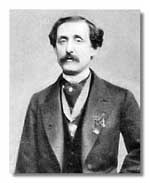Louis Moreau Gottschalk

(1829-1869)
GOTTSCHALK, LOUIS MOREAU (1829–1869), U.S. composer and pianist. Gottschalk grew up in New Orleans where he was exposed to the Creole music with its African-Caribbean rhythms that would later become a characteristic ingredient of his music. A child prodigy he went at 13 to Paris for piano and composition lessons and by 19, through the success of his "Creole" piano pieces, was hailed as the New World's first authentic musical spokesman, and his keyboard virtuosity was compared with Chopin's. After playing in Switzerland (1850) and Spain (1851) with spectacular success, he returned to the United States. His father's death (1853) proved to be a turning-point in his career; he was forced to increase the frequency of his concerts to earn enough money to support his family. For three years Gottschalk toured the country, his sentimental ballads ("The Last Hope," 1854, "The Dying Poet," 1863) proved immensely popular. He also contributed to the new "Western" idiom with his genre pieces Le banjo (1853, 1855). He spent the next five years in Puerto Rico, Guadeloupe, Martinique, and Cuba. There he found his musical roots and his vocation as a composer and wrote some of his finest works, including Souvenir de Porto Rico, Ojos criollos (four hands), a symphony and several operas. He also wrote for the American and French press. In 1862 Gottschalk had to resume his virtuoso career playing again for American audiences. In four and a half months he gave 85 recitals, a brutal pace which he maintained for more than three years, during which he did more than any other American musician to champion the Unionist cause and also to obliterate the line between high and popular art. In 1865, he had to leave the States after being unjustly accused in a scandal. The last four years of Gottschalk's life were spent in a triumphant tour of South America, where also he encouraged local talents, promoted classical music and championed public education. Gottschalk's own account of his troubled life was first published in 1881 as Notes of a Pianist.
Sources:Grove; S.F. Starr, Bamboula! The Life and Times of Louis Moreau Gottschalk (1995); J.E. Perone, Louis Moreau Gottschalk: A Bio-Bibliography (2002).
[Naama Ramot (2nd ed.)]
Encyclopaedia
Judaica. © 2008 The Gale Group.
All Rights Reserved. |